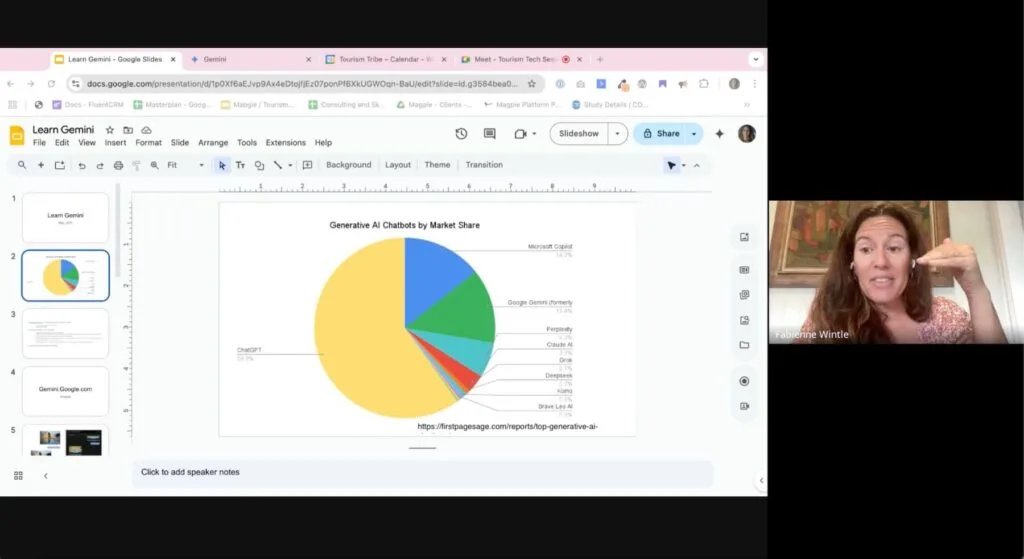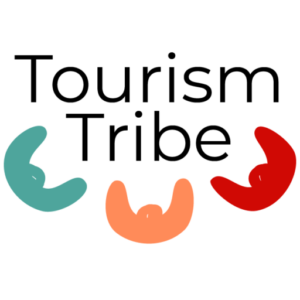Stay Ahead with AI: What Your Tourism Business Needs to Know About Google Gemini (May 2025)

The world of tourism technology is evolving at lightning speed, and Artificial Intelligence (AI) is at the forefront of this transformation. For tourism operators looking to stay competitive, understanding and leveraging AI tools is no longer a luxury, but a necessity.
That’s exactly why our recent Tourism Tech session, held on 15 May 2025, focused squarely on one of the most talked-about AI players: Google’s Gemini. As Fabienne Wintle, our lead trainer for this session, announced, our fortnightly member “coaching calls” have now evolved into focused “tech training sessions,” designed to help you do business faster, smarter, and better by harnessing specific AI tools.
Missed the live session? Don’t worry!
If you’re a logged in Tourism Tribe member with a valid Digital Assistance Plan you’ll see the replay below (a new initiative based on your feedback!). If you’re not a member, this article will walk you through the key takeaways, actionable strategies, and crucial insights shared.
Understanding Google’s Gemini: More Than Just a Chatbot
Fabienne kicked off by explaining that while ChatGPT currently holds the largest market share (Gemini, formerly Bard, is under 15%), Google’s AI offering is a multifaceted tool crucial for tourism businesses to watch. Gemini isn’t just one thing; it comes in three main versions:
- gemini.google.com: The standalone AI chatbot, similar to Chat GPT, but with strengths in handling long-form content (like large PDFs or code) and being “natively multimodal” (built from the start with video, photo, and audio capabilities).
- Gemini in Google Search: This is where AI summarises search engine results, often appearing at the top of your Google search page. This has significant SEO implications.
- Gemini Advanced in Google Workspace: Integrated into tools like Google Slides, Docs, and Sheets to help with tasks like image creation, writing assistance, and formula generation.
The session primarily focused on the first two, given their immediate relevance to your marketing and operational efforts.
Gemini in Action: Capabilities & Current Limitations for Tourism
So, what can Gemini actually do for your tourism business right now?
Sparking Creativity: Image Generation in Google Slides
Fabienne shared her experience using Gemini within Google Slides to create images directly from prompts. For example, a prompt like “create an image of an arrow about to hit a bullseye target in a hyper-realistic photographic style” yielded impressive results instantly. This offers a quick alternative to tools like Canva for spicing up presentations with unique visuals. “Our presentations are about to get spiced up with really cool new images,” Fabienne noted.
Research Powerhouse (with a Caveat)
Using the example of researching “family attractions in Agnes Water and 1770,” Fabienne demonstrated Gemini’s ability to pull relevant information. It identified key spots like the main beach, Captain Cook playground, and even “feeding the fish at the Marina” – an activity likely pulled from blog content rather than a formal product listing.
- The Limitation: Accuracy and timeliness can be an issue. Gemini mentioned the “Paper Bark Forest Walk,” which Fabienne pointed out has been closed for about three years. This highlighted a crucial point: Gemini often reads the snippets (page titles, descriptions, star ratings) of search results for speed, not necessarily the full page content.
- The SEO Takeaway: If information changes (like a closure or a new opening), it’s vital to update your page titles and meta descriptions, not just the body content. This is key for ranking well in both Gemini-powered AI results and standard Google search.
Watermark Removal & Image Transformation: Not Quite There Yet
While some online demos suggest Gemini can easily remove watermarks or drastically alter images (like turning a car into a convertible), Fabienne’s live tests showed this feature isn’t consistently reliable yet. “Don’t always believe what you see on Instagram with Gemini,” she advised after an attempt to remove a logo element yielded quirky results.
The AI Shift: How Gemini is Reshaping SEO and Google Search
This was a core part of the discussion, with significant implications for how your tourism business gets found online.
AI Overviews in Google Search: The New Frontier
Fabienne demonstrated how Google Search now often presents an “AI overview” at the top of results, especially for conversational queries (e.g., “What are the best family-friendly activities in Agnes Water?”). These summaries are crafted by AI, drawing from various sources.
- What Influences AI Overviews? It’s not just traditional SEO ranking factors. Google’s AI considers:
- E-E-A-T Signals: Experience, Expertise, Authoritativeness, Trustworthiness of your content.
- Third-Party Content: Reviews (especially product-specific ones!), social media mentions, and influencer content play a huge role.
- Timeliness & Freshness: Fabienne highlighted how a very recent blog post from a new Tourism Tribe business ranked surprisingly well in an AI overview, suggesting a preference for updated content. “There’s a real shift now in Google with regards to listing things that are very timely and updated,” she observed.
- The Impact: Businesses ranking number one organically might see a decrease in direct traffic as users get their answers from the AI summary. This makes optimising for inclusion in these AI overviews critical.
Product-Level Optimisation is Key
“You need to think at the product level instead of just the business level because everything is now going by product,” Fabienne emphasised. This means:
- Dedicated Product Pages: Each tour or activity should have its own detailed page.
- Product-Specific Reviews: Collect and display reviews on each specific product page, not just a general testimonials page.
- Targeted Linking: When collaborating with bloggers or your local tourism organisation, ensure they link directly to your specific product page (e.g., your “three-hour heli tour”) rather than just your homepage.
Google Things To Do: Amplify Your Tours & Activities
Google Things To Do (an extension of your Google Business Profile for tours and activities) also requires this product-level focus. Fabienne explained, “They require you to have your star rating and the number of reviews on your product page itself if you want the star rating to appear in Google Things To Do.” Without this, your listings (like the 1770 LARC! Tours example shown) might appear without those crucial star ratings, putting you at a disadvantage next to competitors who have them.
Practical AI Strategies & Tools Discussed in the Session
Beyond understanding Gemini, the session delved into actionable ways to use AI:
Content Inspiration from Gemini Searches
When Lydia Rees (Airborne Solutions, Darwin) volunteered for a live Gemini test (“top 10 memorable activities for a couple celebrating in Darwin next month”), the AI generated a relevant list including helicopter tours. Fabienne noted that while the standalone Gemini interface didn’t provide direct website links in this instance (though Gemini within Google Search does), the generated content itself is valuable. “You could be writing a blog post with content similar to the one that came out of Gemini… and start hopefully seeing some visitation from it,” she advised.
Customising Your AI: “Gems” in Gemini & “Projects” in ChatGPT
Fabienne showcased:
- ChatGPT “Projects”: (Likely a paid feature) Allows users to create folders for different businesses/projects, upload specific files, and give tailored instructions, so ChatGPT remembers the context.
- Gemini “Gems”: These are more like custom GPTs with pre-defined commands that help users formulate prompts. Fabienne demonstrated creating taglines for a heli tour in Darwin using a “Copy Creator” Gem, inputting target audience details (e.g., “domestic travellers, fly-in, age 24-44, casual, fun, adventure, safe brand tone”) to get tailored suggestions. Julia Retson observed these seemed “slightly less AI generated” than typical ChatGPT tagline outputs.
The Power of Fresh Content & Local Flavour
Reiterating the success of timely content, Fabienne urged attendees: “Leverage AI-generated content for quick blog posts, ensuring they are tailored to the local language and include personal touches like your own images and customer quotes.”
Staying Updated: Valuable Tools Shared by the Community
Keeping up with the “gazillion” AI tools is a challenge, as Katherine Outback Experience (Annabel Curtain) noted. Fabienne emphasised the power of community sharing within Tourism Tribe. Tools highlighted included:
- Fixer AI: An AI-executive assistant recommended by Tourism Tribe member and award winning Northern Territory tourism operator/owner of Katherine Outback Experience, Annabel Curtain.
- Google’s “Take Notes For Me”: A feature in Google Workspace that Fabienne loves for summarising meetings into shareable, A4 documents linked to transcript and video timings. “I would actually just pay for my Google Workspace subscription to be able to access that,” she said.
- Veed.io : An automatic video reel creation tool. Fabienne shared how they use it to turn podcast recordings (like their “Untangling Tourism Tech” podcast) into social media-ready shorts, saving significant time. Annabel also vouched for its usefulness in repurposing music video clips for social content.
Your Actionable Next Steps & The Tourism Tribe Advantage
The session wrapped up with clear actions and a forward look:
- Immediate Actions for Your Business:
- Review Your Product Snippets: check the titles, descriptions, and introductory content on your individual product pages. Ensure they are accurate, compelling, and contain key information.
- Add Testimonials to Product Pages: Integrate customer quotes and reviews directly onto each relevant product page.
- Optimise for Google Things To Do: Work towards displaying star ratings and review counts on your product pages.
- The Bigger Picture: Understand that AI search, especially Google’s AI overviews, is changing how users find information. Your online presence needs to be robust, rich with product-specific details, and amplified by positive third-party signals.
Fabienne also teased a future tech training session focused specifically on optimising individual web pages for Google AI, recognising that “my job has just become 10 times harder with AI and search!”
Don’t Navigate the AI Revolution Alone!
The insights from this session underscore the rapid changes in tourism technology. Staying informed and adapting is crucial, and that’s where the Tourism Tribe Digital Assistance Plan membership truly shines. Our tech training sessions are designed to:
- Break down complex topics like AI into understandable, actionable advice.
- Provide a platform for sharing tools, successes, and challenges within a supportive community of tourism professionals.
- Offer expert guidance to help you implement these strategies effectively.
Ready to harness the power of AI and other essential tourism technologies?
- Implement the takeaways from this recap.
- Keep an eye out for the recording and notes from this session (shared with members).
- Join us for our next tech training session! The topic will be announced soon.

Free resources to grow your tourism business
Sign up to get our free AI tools, checklists, roadmaps and guides, plus episodes of Untangling Tourism Tech delivered straight to your inbox.


